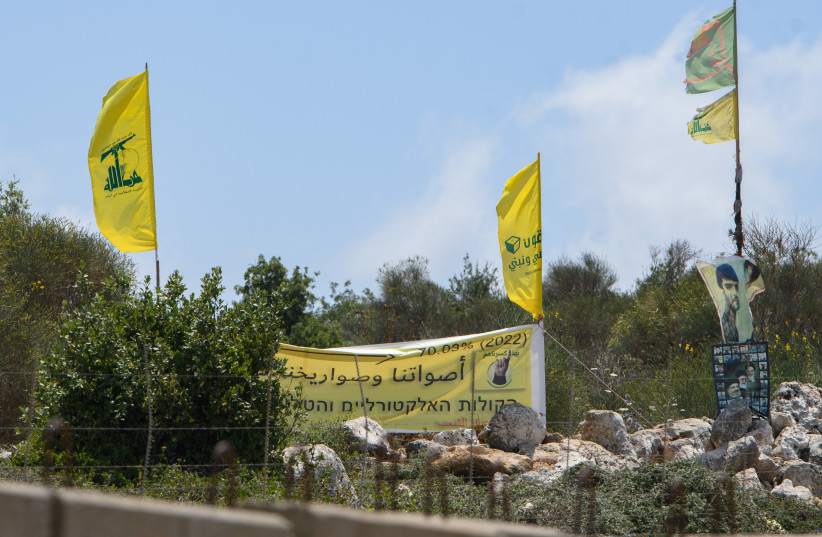Hezbollah released a video on Sunday that shows the terrorist group training for an attack on an Israeli military position, shedding light on its beliefs about its own capabilities.
The video was published after a speech by terrorist leader Hassan Nasrallah was aired, relating to the anniversary of the Second Lebanon War (2006). It comes amid tensions on the Israel-Lebanon border and attempts by Hezbollah to stir up provocations, such as setting up a tent in the Mount Dov area and bringing Lebanese politicians to the border.
Hezbollah's video a retelling of the Yom Kippur War
The video, though, does not actually harken back to 2006; in essence, it is actually a retelling of the Yom Kippur War (1973), when Syria and Egypt attacked Israel.
In the video, the fighters are preparing for battle in their own bunker near the border, after which they move out to attack, using a heavy machine gun, a rocket, and a Shahed-style drone to strike at a mock-up of an Israeli military outpost. The drone is similar to those that Iran has sent to Russia to use in the invasion of Ukraine.

The video also shows Hezbollah using optical observation devices and an anti-tank missile, as well as mortars. The fighters then raid the outpost and “capture” it. A Hezbollah vehicle shows up at the end to mark the victory. Throughout the “battle,” the Hezbollah members suffer no casualties, and there is no resistance to their assault.
According to the military mentality revealed in this video, Hezbollah estimates that the next conflict with Israel will be about territory, and it expects to be successful in grabbing some.
This mentality is not new; it is a concept of battle that is well-known in its doctrine. In this case, Hezbollah is trying to build on past conflicts with Israel and others. In 2006, Hezbollah ambushed a patrol on the border; today, it wants to go beyond that, and it thinks it has improved its capabilities to the point that it can fight a conventional war with Israel.
Pro-Hezbollah media repeatedly have said the group believes it has gained experiences to make this possible. A recent article at Al Mayadeen detailed how Hezbollah thinks Israel invested heavily in defenses – e.g., with Iron Dome – and that its offensive capabilities rely too much on technology. Hezbollah currently has stockpiled masses of missiles and has outfitted its fighters with rifles, mortars, drones, and other systems.
YET THE most poignant thing that this video shows is that Hezbollah ultimately relies more on propaganda than on actual threats. It has become so institutionalized in Lebanon – effectively controlling the south as well as the country’s ability to democratically elect a new president – it has to sit astride two different types of policies.
Our fighters are ready, Hezbollah says
On the one hand, it has to continue to be a terrorist “resistance” force, one that operates underground. On the other hand, it has to continue to operate stunts along the border, enabling people to riot, trying to damage the border fence, or setting up tents.
It must do these two things at once, and this is why it is also publishing these kinds of videos about its militant-terrorist capabilities. It wants to show that the antics of putting up tents and inviting members of the Lebanese government to tour the border and create provocations is not making Hezbollah soft.
Hezbollah showcased with this video that it has its fighters ready. That it used a drone in the video shows it is using the same Iranian technology being sent to Russia to terrorize Ukrainians. But Hezbollah should look at Russia’s failure in Ukraine if it wants to understand how drones like the Shahed are not actually helping Russia win the war.
If Hezbollah is trying to borrow from the Iranian drone doctrine, it would do well to note that Iran’s drones didn’t win the war in Yemen, Ukraine, or in Iraq and Syria. In fact, Iran uses drones to terrorize and harass but never to win wars.
Similarly, Hezbollah has set upon a strategy in the video of trying to “conquer” places where it doesn’t think it will meet resistance so it can wave its flag and claim empty “victories.”
This is not to say the group is not more powerful and dangerous than in the past, but rather that it prefers more boasting and propaganda videos for the sake of relevance. It has done this in the past; this is merely the latest iteration, showcasing Hezbollah’s known strategy and known weaponry.
